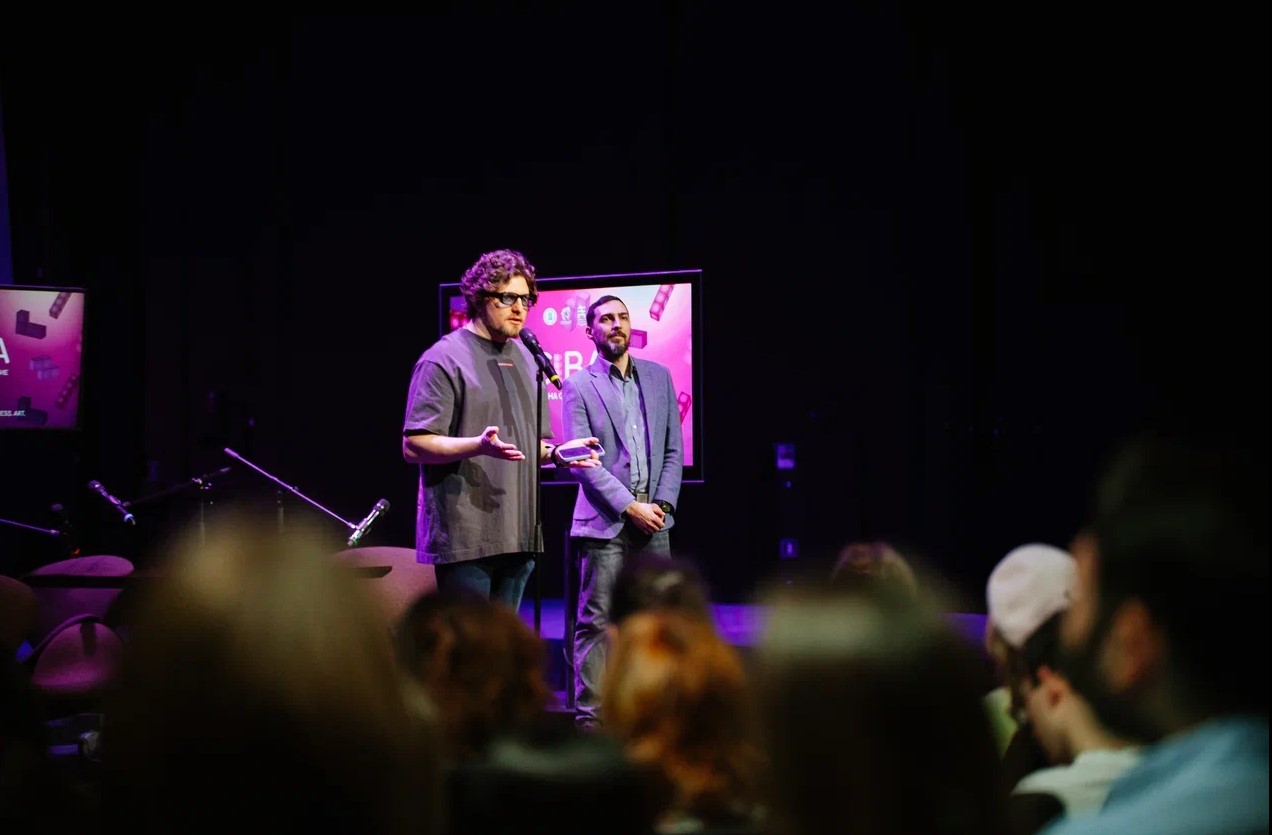‘Trend Tetris’: HSE University-St Petersburg and Alexandrinsky Theatre Hold Fifth CIBA Conference
The New Stage of the Alexandrinsky Theatre hosted the fifth annual CIBA conference, organised by professors and students of the Master's programme 'Arts and Culture Management' at HSE University-St Petersburg. More than 300 participants, including students, creative experts, entrepreneurs, and representatives of cultural institutions, attended the event.

The central topic of CIBA 2025 was trend watching, as symbolised by the video game Tetris. The conference organisers explained that entrepreneurs and creators must master the art of combining elements (fashion trends, resources, teams) to achieve perfect results. This is especially important in a world where new trends appear at breakneck speed like blocks in Tetris.

Elena Zelenskaya
Academic Supervisor of the Master's programme 'Arts and Culture Management'
Each year, CIBA changes its format thanks to its unique nature. We work with a new student team which implements and embodies the concept under the supervision of the project curators. It always makes the event vibrant and creative. The project helps students boost their skills in event management, teamwork, attracting sponsors, and establishing communication with famous people. First-year master's students supplement their portfolios with the completed project at the national theatre.
CIBA 2025 was prepared by 16 students and three curators: Elizaveta Liubimova, Svetlana Supranovich and Elena Zelenskaya. 'Each year, we start by developing a concept, and this time, it was devoted to trends and a game. This is one of several ideas we considered, and it has undergone a lot of transformations,' explains Elena Zelenskaya.
How to Chase a Big Idea
The conference started with a lecture by Varvara Titova, coach for the development of creative thinking and HSE professor, called 'Trend Watching. How to Chase a Big Idea.' The expert explained why knowing how to monitor trends today is a vital skill not only for creative specialists but also for business. 'Trend watching helps to develop strategies and predict the future,' highlighted Varvara Titova.
The speaker shared some methods for developing creative thinking. According to her, generating ideas is often hindered by 'blank page anxiety, a reaction of condemnation, a fear of looking hackneyed, and accusations of plagiarism.' The expert shared 'the secret of genius': 'A genius is different from a regular person because they are not lazy, they do more. To come up with something new, you have to separate two processes: creativity and efficacy. Don't be afraid of accidents—they help you think like an inventor.'
After the creative start, the guests of CIBA were divided into four groups. They created handmade key chains, discussed the DNA of art in business, the interaction between artists and entrepreneurs, and the role of technologies in the work of a designer, as well as participated in an acting workshop.
'The practical part of the conference allowed the guests not only to hear but also experience and feel how creative products are made,' underscored Elena Zelenskaya, academic supervisor of the Master's programme 'Arts and Culture Management.'
Anton Dontsov, expert in the sphere of creative industries, revealed the concept of an efficient tandem of business and art. He highlighted the importance of empathy, which makes it possible to create strong partnerships and find extraordinary solutions.
'Today, we live in an age of new tandems, when the biggest value is generated by the formula 1+1=11. The connection between an entrepreneur and an artist is an avenue for truly important projects. When traditional business transfers into the creative industry, a new environment appears. A good example is Carl Fabergé, who joined in the creative process with Emperor Alexander III and created a legendary product,' highlighted the speaker.
The lecture by Anton Dontsov made an impression on Ekaterina Pirogova, a representative of a law company specialising in intellectual property. According to her, the conference immersed attendees in a different language context, stimulating the thinking process and introducing guests to new terms.
'In our work, we closely cooperate with creative professionals. My task is to be the link between creative people and lawyers. It's important to maintain effective communication, so that lawyers immersed in documents do not lose sight of the context of events in the creative environment.
This conference has a special innovative atmosphere. It truly inspires and enriches you,' says the participant of CIBA 2025.
Gamification: More Than a Game
This year's CIBA included a new format: a live podcast about gamification. Among the speakers were Aleksandr Breganov, curator of the Game Design track at HSE University and host of the YouTube show Dungeons of Chicken Curry (Подземелья чикен карри), Aleksandr Haritonov, community team lead of World of Warships, and Alexey Melnikov, creator of the Youtube channel CG Speak. The experts talked about how the industry developed from Tetris to modern projects, covered the philosophical aspect of games, and examined their role in the development of corporate culture and their influence on the perception of the world.
'Broadly speaking, gamification is everywhere. Even salary is also a game mechanic. At the same time, anything that is difficult is cut out of reality in a game. In a small magic circle, everything is clear,' says Aleksandr Breganov.
According to the speakers, the main future trend in gamification is related to the struggle for attention: 'The amount of concentration people can devote to our product is decreasing. In our industry, the best reward is when a gamer wants to play the game tomorrow.'
'This is the best decision I've made this year,' shares Jasmine Avakyan, graduate of art college and participant of CIBA 2025. 'It made me think about the direction I should develop in. I am a painter, and I really like games but I had no idea how to connect these. This podcast triggered certain thoughts.'
'I am a fan of Dungeons of Chicken Curry,' comments Anastasia Tulupova, podcast viewer. 'I came to the event for Aleksandr Breganov. Unlike the majority here, I don't know much about gaming, but I really liked the deepness of the discussion—especially when it covered philosophical questions and how they are intertwined with game culture. It made me consider looking at computer games closely. Now, I'd like to immerse myself in this topic deeper.'
'I was impressed by the participants' competent speech and the depth of the questions asked. The dialogue with viewers was built very meaningfully. We felt full immersion in the process. It was like watching a high-quality podcast in real time, right in front of me,' shares Aleksandr Strakhov, student of the Master's programme 'Arts and Culture Management.'
'The Bad News? Time Flies. The Good News? We Are Pilots'
The final part of the conference took the form of a panel discussion on the topic 'Nostalgia Trend: A Glimpse into the Past as a Tool for the Future.' The moderator was Yakov Trakhman from the company Afisha. Five speakers from different creative industries discussed how memories of the past can be a powerful marketing tool.
Natalia Belyakova, head of the Laboratory for Communications in Creative Industries at HSE University, underscored the evolution of nostalgia: 'It develops from things to services. The highest degree is nostalgia for a lifestyle.'
Tatiana Maksiutenko, marketing director of the Brusnitsyn cultural quarter, defined nostalgia as a current trend and cited examples of successful projects with a 'retro' concept, including a retro photo studio, a local fashion brand, and 90s and early 00s-themed parties. She highlighted that 'nostalgic marketing is efficient, as it forms a strong emotional bond between a brand and its target audience.' She also gave some examples of 'anemoia'—nostalgia for times one has never lived in. 'Modern remixes of songs, such as 'Komarovo' for the video game Atomic Heart, get millions of streams by young people who never lived in the time of the original. It proves that nostalgia can work even with an audience which doesn't have personal experience of living in a certain period,' says Tatiana Maksiutenko.
Daria Bogdashova from the company Bushe expressed a more critical position by calling nostalgia 'a basic way to manipulate a paying audience.' Nevertheless, she acknowledged that such approaches 'push any industry forward and will never cease to be relevant.'
At the end of the discussion, the participants emphasised that nostalgia could serve as a 'soft power' that unites different generations and creates a common cultural language.

'It's very important for us that CIBA takes place at the Alexandrinsky Theatre,' underscored Alexandr Malich, director of the theatre, in his speech. ‘Even though we are a national theatre and guardian of tradition, we in fact embrace the future. We follow a motto of 'a new life of traditions.' Nothing in art happens without experimentation. An experiment can be a success or a failure, but the sheer process of searching for something new is fuel for creativity, an opportunity for artists to explore the world and grow spiritually. This is what HSE University does as well. I attended the opening of the educational space in the building of the Red Nailer factory. For the first time in 20 years, since graduation, I regretted that I couldn't study there—that is how impressive it was. That's why I applaud HSE University! Thank you so much for being with us all these years, and welcome to the Alexandrinsky Theatre!'
Pavel Kuzmin, Deputy Director for Educational Activities and Digital Transformation at HSE University-St Petersburg, also highlighted the importance of experiments: 'Innovations help us to go beyond conventional, stereotypical actions. I sincerely hope that for each of you, CIBA will be the start of a journey that leads to groundbreaking solutions—just as the Alexandrinsky Theatre found new formats and HSE University came up with new approaches to education.'
Summing up the results of the fifth CIBA conference, Elena Zelenskaya stated that this year, the team was especially strong and the event achieved a high level of quality. 'We always analyse the results right after the event so as not to miss anything. This time, everything went well: the guests, speakers, and organisation were all top notch. The time flew by, and it shows liveliness and passion for the process,' she shared.
CIBA: Creative Industries. Business. Art is a series of educational events organised by the Master's programme 'Arts and Culture Management' and the New Stage of the Alexandrinsky Theatre. The first conference was held in 2021 and the event has taken place annually ever since.

